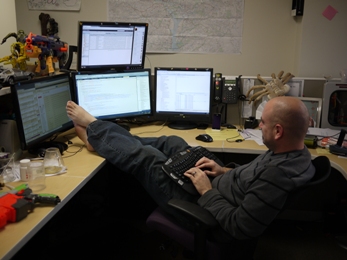
Screen pervasiveness
We are going to have more screens in our lives, screens of all kinds. Remember when every home had just one TV? Today, many homes have multiple TVs, tablets, smartphones, etc. New screens are coming: screens in our cars; refrigerators with touch screens; screens on our coffee tables for magazines, photos and game;, screens in our conference rooms to see satellite offices; screens in our showers for watching TV. As the technology costs go down, we will have more screens.
Screen persistence
I love this prediction. Ken says that screen persistence will allow us to start something on one screen and continue on another. If you read books on the Kindle or Kindle app, you know that you can stop reading on your phone and pick up where you left off on your tablet. In the future, you’ll be able to start a phone call in your car, continue it on your phone when you arrive at your destination, switch seamlessly to video conferencing on the fridge when you get to your kitchen, and switch to your HD TV when you go to your living room or conference room.
Screens that know about you
Remember the scene in Minority Report where Tom Cruise, with a surgically transplanted eye from someone else, gets welcome to a department store by name (the other guy’s name) and encouraged to buy something? Ken says that in the future, screens of all kinds (billboards, large and small) will know who we are, our physical characteristics, our interests, our purchasing history, etc., and project a personalize ad or message. Perhaps when you turn on your TV at home, it will let you know which of you favorite shows have new episodes waiting. It’s clear that we’ll need some type of system to grant or deny access to our information by all these screens. It’s going to be a big privacy mess but marketers will be all over the opportunities.
Screens will know about themselves and interact with other screens
Today, screens aren’t aware of other screens. But in the future, your iPad might automatically turn into a controller for a TV when you enter your living room. Or attendees at a conference can share content on their tablets while in the same meeting room. Related to screen persistence above, your device will pass calls and data seamless to each other. You’ll be able to start a game on one TV and then when dad comes home and wants to watch the game on that TV, your controller will let you continue your game on another TV.
Screen interactions will change
Today, we can type, swipe and do a little voice. In the future, we’ll be able to use voice commands to ask complicated requests of our devices. An example: “Pull up my 2015 tax return (which is presumably in the cloud somewhere) and tell me my effective tax rate back then.” You will be able to use your body to control screens (kind of like the Kinect, but more sophisticated). And touch commands like in Minority Report will become a reality.
Project Glass from Google is an example of the new generation screen (it’s going to be a head mounted display, a pair of glasses) that will let us interact with the world in new and different ways.
I don’t now about you but I am excited about this brave, new world that will be full of screens. Thanks, Ken, for sharing your predictions for the future! What prediction are YOU most excited about?


2 replies on “I’ve Seen the Future and It’s Full of Screens”
Microsoft and Apple have already begun to dip their toes into screen persistence. Particularly, using Xbox SmartGlass, you can be playing a game on one device and then transition to another when you need to change locations, or use your tablet or smartphone to look at the cast and fun facts of a movie you’re watching on your HD TV. The technology is coming quickly, for sure.
I love screens; we have plenty of them. But we need some balance, too. I’m already seeing small kids not wanting to look up from their screens and already having eyesight issues. I don’t want to live in a world like the Axiom in WALL-E, where everyone does nothing but look at their screens and they have no idea what is happening in the real world around them.